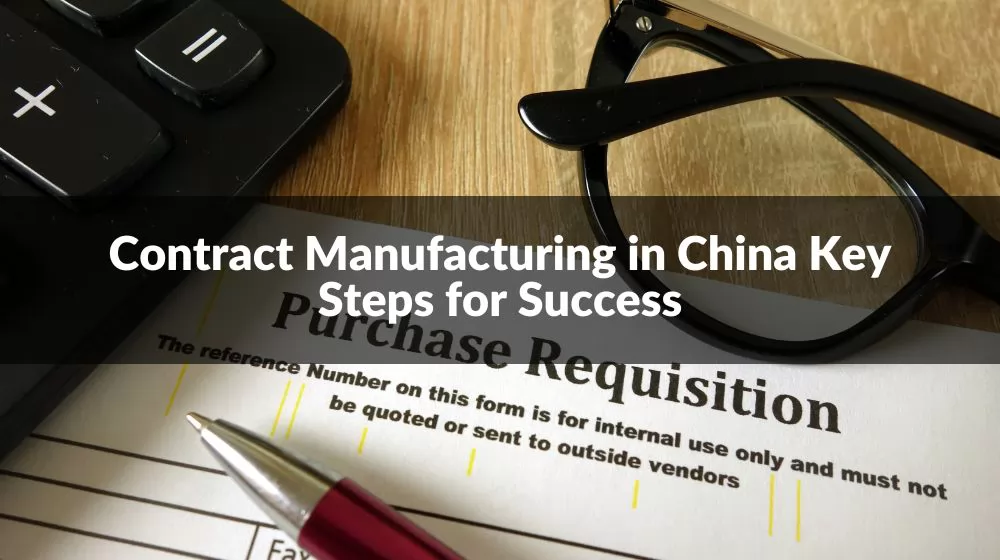
In order to achieve successful contract manufacturing in China, there are several critical steps to follow. At the heart of global manufacturing, China offers a wealth of contract manufacturing opportunities. However, there are some important steps and strategies that need to be taken to ensure that the collaboration goes smoothly and achieves the desired results. Below are the key steps for contract manufacturing in China to ensure successful collaboration goals and the best possible outcome.
Understand the overview of contract manufacturing in China
Chinese contract manufacturing refers to entrusting the manufacturing process of products to Chinese manufacturers or suppliers in order to reduce production costs and improve production efficiency. As one of the world's largest manufacturing bases, China has abundant human resources and advanced manufacturing facilities, attracting many domestic and foreign companies to choose China for contract manufacturing.
China's contract manufacturing industry started in the 1980s after the implementation of the reform and opening up policy, which attracted a large number of foreign companies to invest in China. Due to China's advantages of abundant human resources, relatively low labor costs, and relatively complete industrial infrastructure, contract manufacturing has developed rapidly in China.
The range of contract manufacturing products is very wide, covering many fields such as electronics, textiles, furniture, toys, auto parts and so on. Chinese contract manufacturing companies usually produce according to the requirements of foreign customers, and operate in strict accordance with technical specifications and quality standards to ensure that product quality meets customer needs.
One of the strengths of Chinese contract manufacturing is flexibility. Since Chinese enterprises have the ability to quickly adjust production lines and production capacity, they can adjust production according to market demand and customer requirements. In addition, Chinese contract manufacturing companies can also reduce production costs through economies of scale and provide highly competitive prices.
Therefore, the following aspects need to be considered when choosing Chinese contract manufacturing:
Intellectual property protection: When working with Chinese manufacturers, it is very important to ensure the protection of intellectual property rights. Take appropriate legal and contractual measures to protect your intellectual property against the risk of infringement.
Cultural differences: There are differences in culture, values and business practices between China and other countries. Knowing and respecting Chinese cultural customs and business etiquette is crucial to building a good working relationship.
Quality Control: Make sure that Chinese manufacturers have proper quality control systems and processes in place to ensure that the quality of the product meets your requirements and standards. Establishing an effective quality inspection and monitoring mechanism, as well as close cooperation with manufacturers, is the key to ensuring product quality.

A Few Tips for Finding the Right Contract Manufacturer
Find a contract manufacturer that meets your requirements
You can identify your own type of contract manufacturing partner by doing a search on social media or a search engine.
If you're trying to find a good partner, it takes a lot of time and effort. So it is better to consider the professional help of a purchasing agent. These sourcing experts have extensive experience in vetting and matching companies with ideal contract manufacturers from China. They are carefully screened and evaluated covering several key aspects including manufacturing capabilities, quality standards, technical equipment and compliance requirements. By working with these experts, you can get a curated list of manufacturers that meet your needs.
Sourcing agents can recommend suitable Chinese contract manufacturers for you based on your needs and budget. Through on-site visits, interviews and background checks, they ensure that the recommended manufacturers are reputable and have reliable production capabilities. These agents have established long-term cooperative relationships with manufacturers in China and can provide comprehensive support and consultation to help you with contract negotiation, supply chain management and quality control.
And by using a supplier/manufacturer sourcing agent, you save time and effort while reducing the risk of working with unfamiliar manufacturers. These professional agents will provide you with reliable Chinese manufacturer options, ensuring that you find a partner that matches your needs for high-quality and efficient contract manufacturing.
Learn about manufacturers' areas of expertise
It can be understood through the following aspects:
Information on manufacturers is gathered by means of internet searches, reference to industry reports and catalogs, and more. Learn about their establishment time, development history, product range and target market, etc.
If possible, arrange a visit to the manufacturer's factory or production base. This will allow you to get a first-hand look at their production facilities, technology level and production process. You can observe their equipment and production lines, and communicate with the staff to learn about their professional fields and abilities.
Speak with a sales representative or someone from the manufacturer and ask questions about their area of expertise. Ask about their experience and expertise in the field, and whether they have experience building similar products. This can help you assess whether they have the expertise to meet your needs.
To learn about a manufacturer's experience and capabilities in a particular field, you can ask them for case studies or customer references. These cases and references will showcase their successful projects and client collaborations in this field, helping you to assess whether they are suitable for your needs.
Check whether the manufacturer has relevant industry certifications and qualifications. For example, ISO certification, trade association membership or other relevant certification. These certifications and qualifications demonstrate a manufacturer's expertise in a specific field and ability to meet standards.
Know how his quality management system is
Check whether it has passed relevant quality certifications such as ISO 9001.
Understand the production process control measures and quality control steps.
Ask about quality inspection and testing procedures to ensure you have the appropriate equipment and expertise.
Understand the defective product handling process, including problem tracing and continuous improvement measures.
Inquire about how customer feedback and complaints are handled, and pay attention to their timely response and problem-solving capabilities.
Conduct reviews and assessments, request relevant documents and records.

Request samples and inspect
To really evaluate a contract manufacturer's work, they can be asked to provide a sample that they communicated with a purchasing agent to match their purchase order. Usually, contract manufacturers in China are very willing to provide samples of products and willing to share various aspects involved in the manufacturing process, such as raw materials, spare parts, machinery/tools, etc. They can even share virtual design examples using CAD/CAM technology, especially if they own the intellectual property rights to the product design and are authorized to make modifications.
By using these samples, various factors such as color, texture, quality, size, durability, functionality, ease of maintenance, and compliance with specifications can be checked. Most samples will be sent to you within 2-3 weeks. If unsatisfied with certain sample aspects, the sourcing agency can specify the desired changes and obtain a new sample set for evaluation. Usually, contract manufacturers in China will provide 2-3 different samples for evaluation.
Such a sample evaluation process will help us gain a comprehensive understanding of the manufacturer's work quality and compliance.
Learn about supply chain management
-
Supplier selection and management methods.
-
Raw material procurement and supply chain network.
-
Inventory management and avoiding backlogs.
-
Logistics and transport management, including time and cost control.
-
Information systems and technical support capabilities.
-
Risk Management and Response.
-
sustainable development strategy.
-
By understanding these aspects, a manufacturer's supply chain management capabilities can be assessed to ensure timely delivery and quality reliability of products.
Understand contract terms and legal matters
Carefully review the contract terms, including product description, quantity, quality standard, delivery period, price, payment method, liability for breach of contract, etc. Make sure the terms of the contract are clear, reasonable, and meet the needs of both parties and legal requirements.
Consult a professional lawyer, especially one who understands international trade and contract law. They can help you interpret the terms of your contract and provide legal advice to ensure your rights are protected.
Make sure that there are appropriate intellectual property protection clauses in the contract, including non-disclosure agreements, trademark and patent protection, etc. Make sure your intellectual property rights are fully protected and respected during the cooperation process.
Make sure contracts include appropriate dispute resolution mechanisms, such as arbitration or legal proceedings. Identify the competent court or arbitration institution, and specify the applicable law and language. This helps resolve any disputes during contract performance.
Make sure the delivery and acceptance procedures for the product are clearly defined in the contract. Including product inspection, acceptance criteria and delivery documents, etc. This helps ensure that you receive products that meet your requirements, with the necessary credentials and documentation.
Know the variation and cancellation clauses in the contract. Determine the circumstances under which changes can be made or the contract can be terminated, and understand the associated procedures and responsibilities. Make sure the contract is fair and enforceable for both parties.
Ensure contracts include applicable compliance requirements such as quality standards, environmental protection, labor rights, etc. Ensure that manufacturers comply with relevant laws and regulations in the production process, and meet the requirements of sustainable development and social responsibility.
Confirm and prepare OEM contract
Once you are satisfied with the quality of the samples received, it is recommended that you sign an OEM contract. Such a contract is more comprehensive than a purchase order, especially if you plan to order from a contract manufacturer in China multiple times during the year.
When drafting an OEM contract, the following aspects need to be considered:
-
Raw Material Sourcing: Determine whether you will provide raw materials or source them with a contract manufacturer.
-
Product Reordering: Clarify whether product reordering should be done manually or automatically through the system.
-
Production Milestones and Deadlines: Determine when and where you want your product to be delivered.
-
Branding: Find out if your brand name will be published on the product, or if the manufacturer would like to have their brand name on your product.
-
Marketing: To clarify whether the promotion of the product in China is one of the manufacturer's responsibilities.
-
Payment and Financing: Find out if the contract manufacturer offers financing, and create a payment schedule. Do you need to request a trade credit?
-
Duration of the partnership: determine the duration of the partnership, is it a one-time collaboration or an annual renewal plan?
-
Intellectual Property (IP): Determine if contract manufacturers have access to your intellectual property.
-
Advertising Confidentiality: Find out if contract manufacturers are able to use your partnership to advertise their business.
-
Product warranty: clarify the content and applicable time of product warranty terms.
By clearly stipulating the above points in the OEM contract, you can better cooperate with contract manufacturers in China and ensure that the rights and interests of both parties are protected.
How to make better use of Chinese contract manufacturing agreements
Carefully review contract terms
Careful review of contract terms is a critical step in ensuring the success of a China contract manufacturing agreement. During the review process, attention needs to be paid to key aspects such as product specifications and requirements, delivery deadlines and locations, prices and payment methods, quality control and acceptance criteria, legal liability and breach of contract clauses, intellectual property protection, and contract modification and termination clauses. By carefully reviewing the terms of the contract to ensure that they are clear, reasonable and effective, deviations in understanding and disputes can be avoided, and a solid foundation can be laid for the smooth execution of contract manufacturing agreements.
Strengthen quality management
Strengthening quality management is key to ensuring the success of China contract manufacturing agreements. To achieve this, it is necessary to establish clear quality standards, implement quality control measures, conduct product inspections, establish a supplier management system, equip appropriate quality inspection equipment, and establish a continuous improvement mechanism. Through these measures, product quality consistency can be improved, reject rates can be reduced, and the reliability and success of contract manufacturing agreements can be enhanced.
Establish effective communication channels
Establishing effective communication channels is key to ensuring the success of a China contract manufacturing agreement. To this end, it is necessary to clarify the main contact person, choose the appropriate communication method, regularly communicate and update progress, establish a platform for sharing documents and files, respond to and solve problems in a timely manner, and respect and understand cross-cultural communication. Through these measures, the communication and coordination between the two parties can be promoted, the efficiency and smoothness of the implementation of the agreement can be improved, and the expected results of cooperation can be ensured.
Consider the sustainable development of partners
When considering China contract manufacturing agreements, it is important to focus on the sustainable development of partners. Key aspects such as environmental protection, social responsibility, supply chain transparency, sustainable supplier relationships and assessment of sustainability indicators need to be addressed. By emphasizing the sustainable development of partners, we can promote the application of the concept of sustainable development and achieve a win-win situation of economic efficiency and sustainability.
Create supply chain transparency
Establishing supply chain transparency is an important aspect of ensuring the success of contract manufacturing agreements in China. The following are key points for establishing supply chain transparency:
Source of raw materials: Understand the source and supply chain path of raw materials. Ensure partners use traceable raw materials and comply with relevant environmental and social standards.
Production Process Visualization: Ensure that you can understand the production process of the product. Share the information of the production process with partners, including process flow, production equipment and operation methods, etc.
Supplier Audit: Periodically audit and evaluate suppliers for compliance and reliability. Ensure that suppliers comply with regulatory requirements and have good production management and quality control systems.
Product traceability: establish a product traceability mechanism to track the production and distribution process of products. Know important details such as batch information, production date, storage conditions, etc. of the product.
Environmental and Social Risk Assessment: Assessing environmental and social risks in the supply chain. Learn about suppliers' environmental management measures, labor rights protection and social responsibility performance.
Compliance requirements and certifications: Ensure supply chain compliance with relevant regulatory requirements and industry certifications. For example, environmental management system certification, social responsibility certification, etc.
Information sharing and cooperation: Establish a mechanism for supply chain information sharing and cooperation. Establish partnerships with all parties in the supply chain to jointly promote supply chain transparency and sustainable development.

Conclusion:
There are key steps in contract manufacturing in China that can give you a chance of success. By gaining insight into your partners as well as contractual terms and legal matters, you can better select the right manufacturer. At the same time, establishing a good communication channel can ensure the smooth implementation of the contract manufacturing agreement. By following these key steps, you will be able to maximize the advantages of contract manufacturing in China for successful cooperation and quality product manufacturing.
Coolo, as a professional procurement agent in China, has rich experience and has solved many procurement problems for western customers, and can complete procurement efficiently, saving time and cost.



